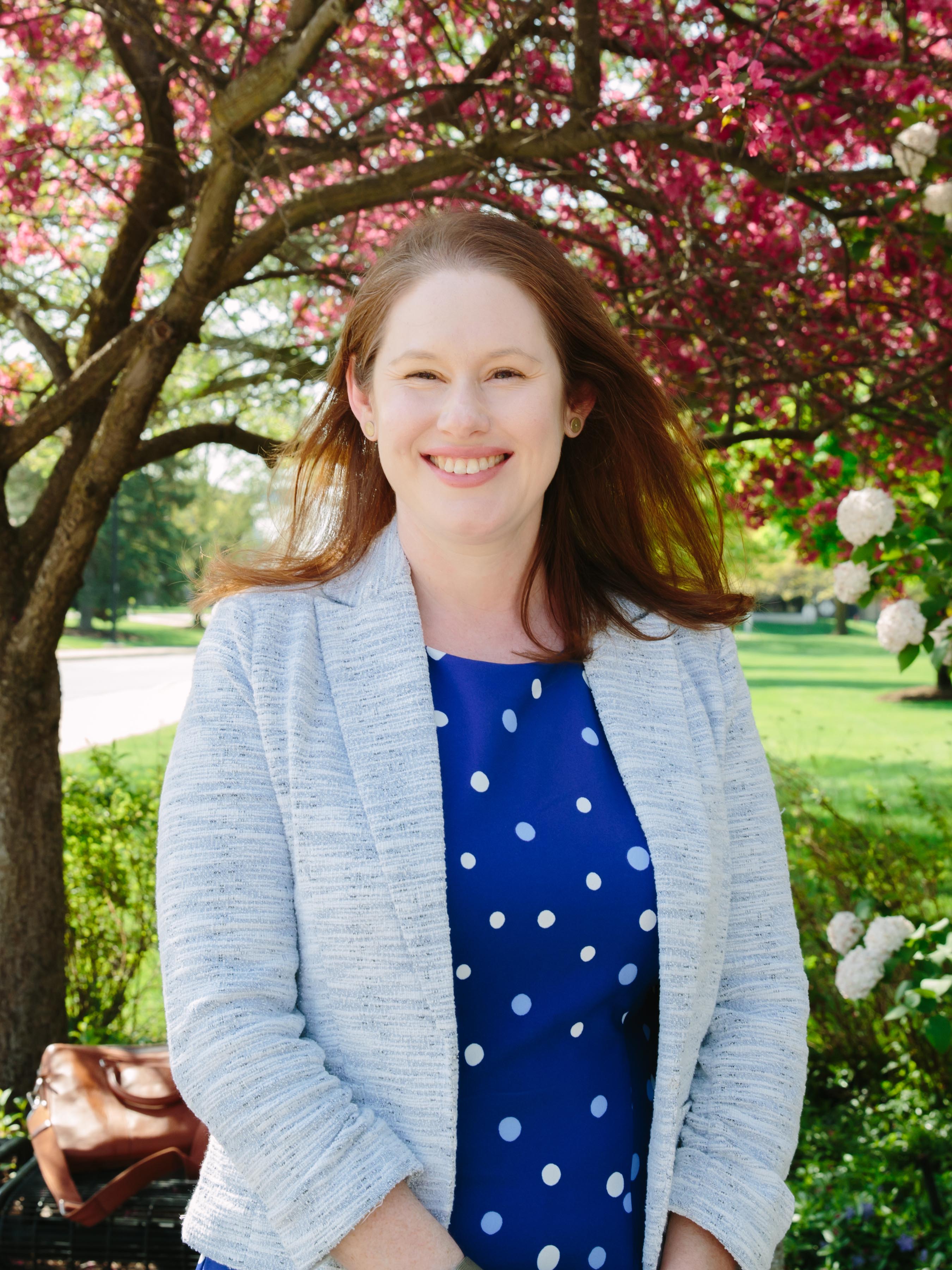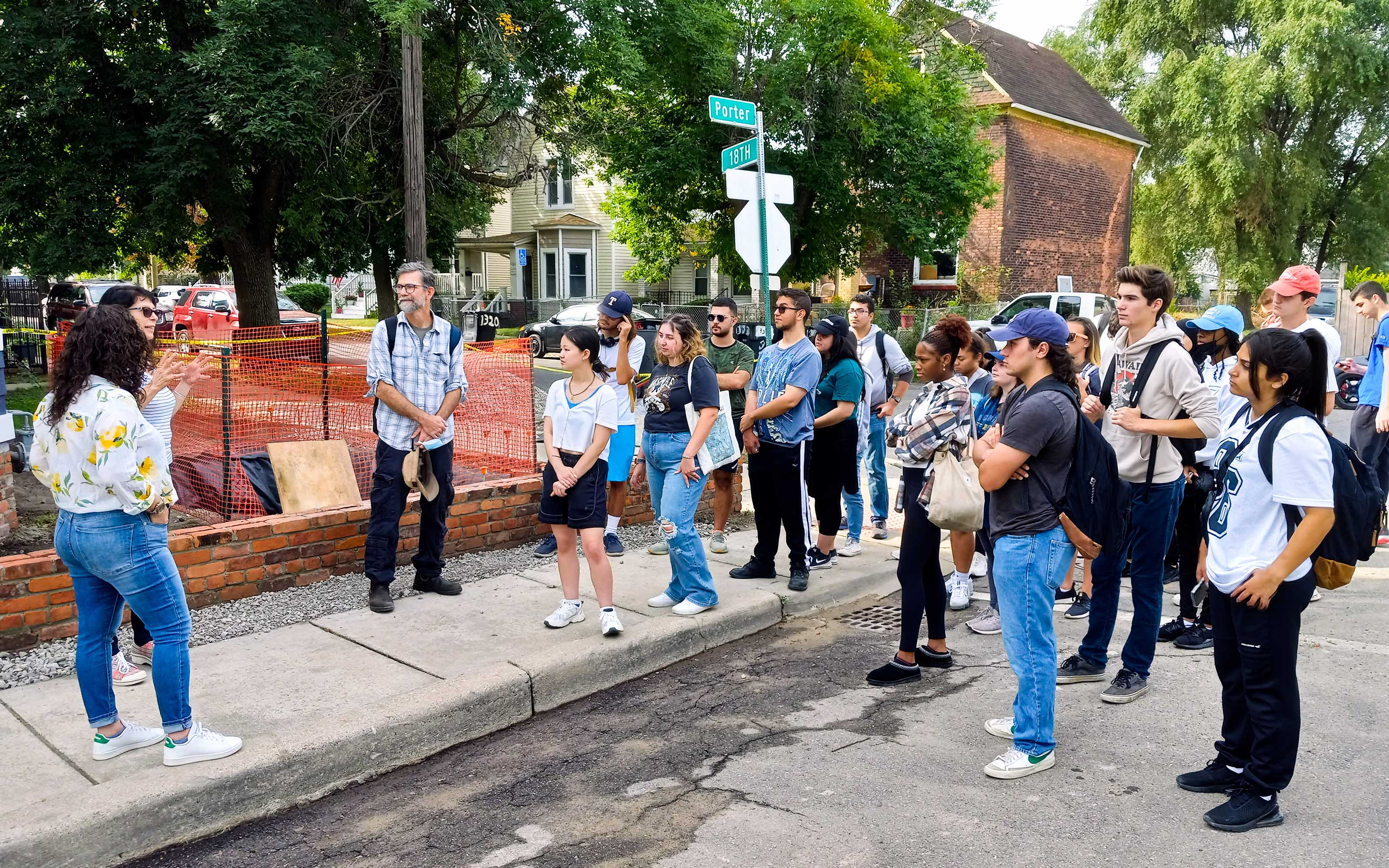
It’d be difficult for Assistant Professor of Communication Margaret Murray to pick her favorite from among the podcast pilot episodes her students produced during the debut semester of the Exploration in Storytelling course. There was “Spark,” produced by student Carley Wehab, about the twisting journeys people take to find their careers. Students Mouminah Sadah and Reem Alsomairi teamed up for a show exploring what it means to be hijabi, including how they’ve personally dealt with discrimination. Murray’s students were legitimately wowed by the offbeat comedy show produced by Channing Smith, in which he did all the characters’ voices for a mock self-help call-in radio show. And “What the Dunk,” a podcast about weird NBA conspiracy theories, would definitely make Murray’s short list, even though she couldn’t care less about basketball.
Producing these podcast pilots wasn’t just a course project. In large part, it was the course. There weren’t any exams or quizzes, and the vast majority of students’ class time was spent learning core skills, like how to structure a narrative, use audio equipment, interview people, write scripts and edit using Adobe Audition. Outside of class, homework assignments consisted of things like listening to a range of podcasts to get a feel for the genre. But otherwise, Murray says the students pretty much just went for it. Part of the way through the course, they had to turn in a draft episode, peer review a draft for a classmate and get feedback of their own — all leading up to producing a final episode and a short marketing trailer. “We graded the quality of the feedback they gave during their peer review, and graded the trailer and the final, but that was pretty much it,” Murray says. “I mean, they did a ton of work: They had to do a lot of writing, reviewing, storyboarding, editing, but their entire grade was basically just the project.”

The class, which Murray co-taught with Journalism Professor Tim Kiska, producer and host of the popular “Detroit History Podcast,” was their first official experiment in practice-based learning, or PBL, an initiative that UM-Dearborn has been rolling out across the four colleges for the past year-plus. Even PBL advocates admit that the term can be a bit difficult to define, and Associate Professor of Political Science Emily Luxon, who’s been helping with the rollout, says UM-Dearborn has intentionally taken a flexible approach. At the university, the “P” in PBL can actually stand for “practice,” “project,” “problem” and even one “C” — “case” — to give faculty some latitude in organizing their PBL courses in ways that work best for their disciplines. But whatever the format, the core idea is that learning has a different texture when you’re actively solving a challenge that, one, connects to the world outside the classroom, and, two, doesn’t have a preordained path to the finish line. The former aims to embed learning with a new kind of relevance — both in terms of the students’ eventual careers and their personal interests, as the subject matter for specific projects is often left up to the student. And having to accomplish a somewhat ambiguous goal — like “make a podcast” — means students have to learn, synthesize and apply a wide variety of information and skills. It’s certainly a much different educational experience than memorizing definitions for a multiple choice test or even a blue book exam, which Luxon says often is ultimately just measuring whether a student can “show that they can tell you what you told them in the same language you used.” “There are other ways to get at understanding than to tell me what I said in your own words,” Luxon says. “Students are better able to have understanding if they can integrate it into their own way of thinking.”
Across UM-Dearborn’s four colleges, PBL is taking all kinds of interesting shapes. In the College of Business’ Bloomberg Lab, students are managing a real stock portfolio with real money that routinely outperforms the major stock indexes. In the College of Engineering and Computer Science, Assistant Professor Fred Feng is jazzing up his potentially dry-sounding Applied Statistical Models in Engineering course by having the students build models that analyze actual data from a real phenomenon of their choosing. Since it’s the modeling techniques he’s interested in students learning, their projects don’t even have to be engineering-related. In the College of Arts, Sciences, and Letters, students in Provost and French Professor Gabriella Scarlatta’s translation course will be partnering with organizations to translate materials for their constituents — a vital service that’s often cost prohibitive for smaller organizations. And in the College of Education, Health, and Human Services, Associate Professor Natalie Sampson jokes that her department “was PBL before it was PBL.” For six years, students in her Community Organizing course have been actively collaborating on projects with partner organizations, like the Dearborn Health Department and local schools, to complement their coursework on the different theories of social change and the history of social movements.

One of the defining qualities of PBL is that it tends to disrupt the usual hierarchy between theory and practice. For example, Murray says students typically wouldn’t have an applied learning experience like this until their junior or senior year, because the conventional wisdom has always been that students needed to spend a couple years learning a bunch of background knowledge, and maybe even pick a career path, before they’d be ready for a big applied project. But the students in Murray’s class are mostly first-semester first-year students. “They don’t have a strong idea of what it means to be at a university, and right off the bat, they get to do this really cool project that they can then put on their LinkedIn or their social media,” she says. “Personally, I think the university is really smart for pushing this, given today’s retention challenges. Imagine your first year of classes is all ‘read this textbook, take this test, memorize, prove to me you understand this.’ I think it’d be easy for a lot of students to just say, ‘this isn’t for me.’”
Making learning more engaging and effective is certainly a big part of UM-Dearborn’s rationale for integrating PBL into the student experience. But Scarlatta says it’s also about being more explicit with students about how what they’re learning — and what they’re paying for — connects with their lives and career aspirations. “Today, they’re hearing that you don’t need a college education anymore, or maybe you only need the first two years, or stories of people starting companies who never went to college,” she says. “But unfortunately, it doesn’t work that way for everybody. For our students, the vast majority of whom don’t come from privileged backgrounds, we are their gateway to building the skills and social networks that will lead them to success. So we have to make a better argument for the value of higher education. And by linking the theory to the world outside the classroom, it’s so much easier for them to see it, because they get to
live it.”
Interestingly, for something potentially transformative, the rollout of PBL at UM-Dearborn has had a somewhat slow and steady feel to it. That’s by design, according to Scarlatta and Luxon. As places built around enthusiasm for big ideas, universities can no doubt be susceptible to big top-down initiatives. Instead, UM-Dearborn is attempting a more organic, grassroots approach with PBL. Rather than, say, requiring all classes to switch to PBL formats, or even classes to have at least one PBL assignment, the university is counting on early adopters to grow the PBL culture through experimentation at the college level. To support that effort, the administration has sent dozens of UM-Dearborn faculty to train with faculty and staff at the Worcester Polytechnic Institute, an engineering and technology-focused university in Massachusetts that’s been a leader in PBL. Faculty have also started informal resource groups and hosted “PBL Palooza” events so they can candidly learn from each other’s successes and failures. And the Provost’s office recently announced this year’s Provost Fellow would focus on coordinating the next phase of PBL at UM-Dearborn.
“Right now, we’re seeing this initial step, where people are linking up with each other and with resources, mostly via word of mouth,” Luxon says. “And that’s setting us up to take the next big step. Is it a central repository where faculty can get resources for PBL, or someone with an eagle-eye view to link people up? What would that look like? Where would it live? Those are difficult questions. But it’s exciting because we’re building it ourselves, and doing some trial and error and figuring out the best way to do this on our campus, for our students. It’s become a campus project — to do projects.”
###
Story by Lou Blouin




